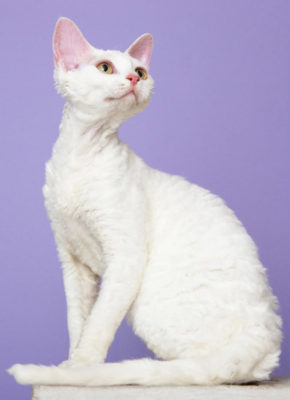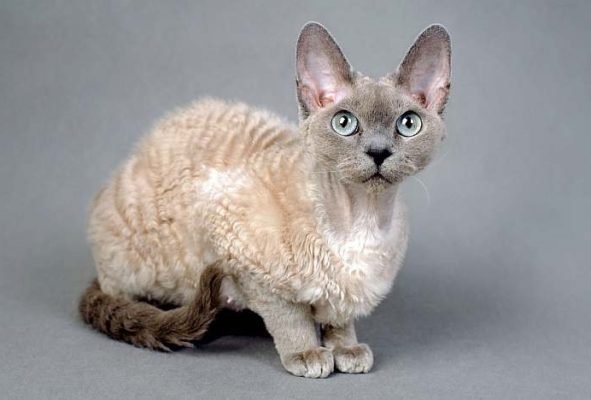German Rex
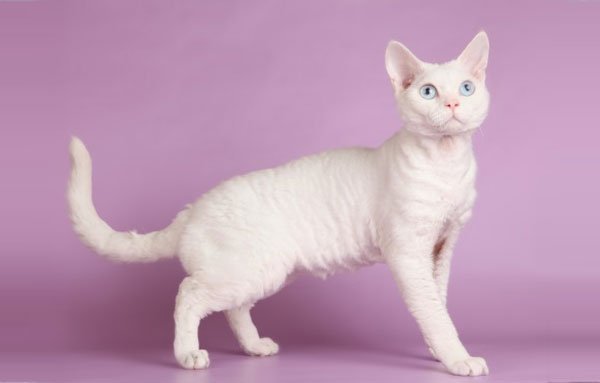
Representatives of this breed have a positive and friendly personality. They quickly and strongly become attached to the owner and family. The German Rex takes part in all family affairs and loves to be in the center of attention. The pet poorly tolerates loneliness.
Table of Contents
Breed Information
| Origin | Germany |
| Size | 23-27 cm |
| Weight | Males 4-5 kg Females 3-4 kg |
| Fur Type | Short-haired |
| Color | Anyone |
| Lifestyle | Indoors |
| Lifespan | 15-17 years |
| FIFe Classification | Group III: “Short-haired and Somali” Breed designation – GRX |
| WCF Classification | Group 3: “Short-haired” Breed designation – GRX |
| TICA Classification | – |
| Group | Short-haired cats, cats for kids, rare cats, hypoallergenic cats |
| Price | $100-300 |
Breed Photos
Origin History
The history of the breed dates back to the 1930s. On a farm near Königsberg, unusual curly-haired kittens were born. They were born as a result of mating Angora and Russian cats. Later one of the breeders noticed the kittens and began breeding them. Apart from him, other breeders, as well as the Koenigsberg cattery, became involved. Thus the breed spread considerably.
After the victory in World War II, the Allied forces took the beautiful cats as trophies. It is how the German Rex spread throughout Eastern Europe. In 1970, the standard of the breed was approved. The cat was recognized by all felinological organizations except the International Cat Association.
Appearance
The German Rex has a medium-sized athletic body. The body of the cat is rectangular; the skeleton is strong. The chest is oval. The head is round with developed cheekbones and a neat chin. The medium-sized eyes are wide apart. Their color usually corresponds to the color. Large ears with rounded tips stand upright. The nose is flattened, and the mustache is wavy.
The pet’s slender legs end in oval paws. The hind limbs are usually larger and longer than the front limbs. The tail is short, tapering toward the end, often bald. The coat is short and curly. Coloration can be absolutely any.
Character
Representatives of this breed have a positive and friendly personality. They quickly and strongly become attached to the owner and family. The German Rex takes part in all family affairs and loves to be in the center of attention. The pet poorly tolerates loneliness.
A cat loves active games and movement; it never sits still. And the best companions to play with are children, whom the German Rex adores. It is characterized by high tolerance and will never hurt a child. With other animals, such as dogs, the cat gets along just fine. The exception will be rodents and birds, in which the pet sees prey.
Care
A cat’s short hair should be combed out once every 7-10 days. Do it with special brush-mittens. During the shedding period, repeat the procedure several times a week. Do not bathe your pet more often than once every two or three months. Use a special shampoo.
It is advisable to brush the German Rex’s teeth every day or at least three times a week. The eyes and ears need special attention. Clean the cat’s eyes daily from excrement. Ears should be inspected and cleaned several times a week. Don’t forget to trim your cat’s claws every ten days. Also, watch the temperature in the house so that the cat does not get too cold.
Education
The German Rex has high intelligence and mobility. The cat is easily accustomed to the litter box and scratching post. At the same time, early socialization is still important. Excessive energy and curiosity of the cat can be directed in the right direction.
A capable pet is not difficult to train. Take responsibility for the process and be patient and restrained. Show commands calmly and never raise your voice. Reward him with a yummy treat if he does. In this case, you should not worry about the result. A clever and obedient puppy will pay you back in full.
Common Diseases
The German Rex has very good health. Due to its natural origin, mutations and genetic abnormalities are not characteristic of the cat. However, the breed is prone to obesity and allergies. Also, the pet can suffer from skin diseases such as eczema and shingles. Parasites are no stranger to the German Rex like other cats. Ticks, worms, and fleas can affect his body.
So every two to three months, have your cat dewormed. Also, buy the cat a collar against parasites. Take your cat to the veterinarian regularly and get the necessary vaccinations. With proper care and nutrition, the cat will live about 17 years.
Nutrition
Keep a close eye on the German Rex’s diet. Don’t overfeed him to avoid obesity. You need to be careful, as the cat eats everything in a row. You can feed the cat both industrial food and natural food. The former includes essential vitamins and minerals.
If you go for the second option, make sure that your cat’s diet is correct. A mobile cat needs a lot of protein. They are contained in meat and dairy products. Meat products should be lean varieties: beef or chicken. Suitable both in raw and cooked form.
Also, give your pet by-products, saltwater fish, and eggs. Don’t forget about porridge and cooked vegetables. Feed your cat rice, buckwheat, and oatmeal. Add fruits and herbs to the German Rex’s diet.
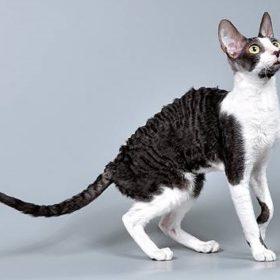 Oregon Rex
Oregon Rex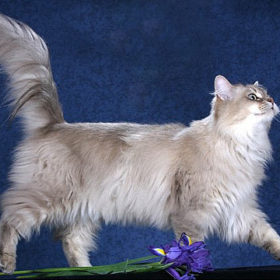 Chantilly-Tiffany
Chantilly-Tiffany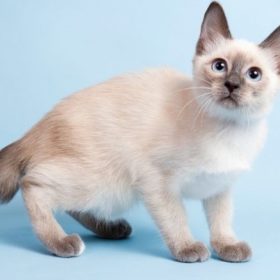 Toybob (Skif-Thai-Don)
Toybob (Skif-Thai-Don) Burmilla Shorthair
Burmilla Shorthair Thai
Thai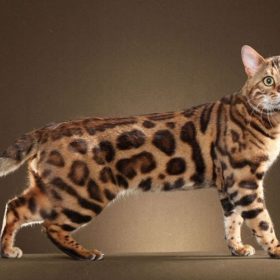 Bengal Cat
Bengal Cat